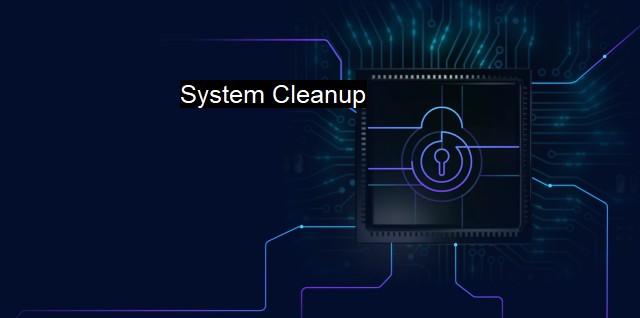What is System Cleanup?
Ensuring Cybersecurity: The Significance of Regular System Cleanup to Optimize Device Performance
System cleanup is an essential process in the cybersecurity ecosystem, particularly in keeping antivirus software and systems updated and efficient. Typically, it involves performing routine scans, removing redundant data, uninstalling unnecessary programs, and addressing concealed threats in an operating system regularly. This operation helps to maintain performance, protects against digital threats, and sustain operational effectiveness, thereby securing the overall system's health.The broad scope of system cleanup, specifically covers identification and removal of known and potential threats to the system. Viruses, malware, spyware, ransomware, trojans, and other digital threats are increasingly prevalent in today's world. Hence, using a comprehensive antivirus software program, which often encompasses system cleanup tools, has become a fundamental part of establishing online security and protection efficiency. The optimization of these tools aids in checking all files, programs and codes in the system to clear away dubious activities.
One reward of regular system cleanup from the cybersecurity viewpoint is that it improves system health and performance by removing unneeded, duplicate, or temporary files that can hinder efficient system operation. By clearing out old, unused files and applications, overall system speed can be optimized, and more storage space can be freed up on the user's device.
Another relevant aspect of system cleanup in cybersecurity is that it allows for detailed and regular inspection of the entire device’s hard drive and operating system. This process assists in discovering irregularities or system vulnerabilities that might be exploited by malicious software or hackers. As such system vulnerabilities proficiently detected can be fixed or updated, reducing the potential risk of cyberattacks. this system review procedure provides an opportunity to make system improvements, where weak spot areas in security can be identified and upgraded for enhanced protection.
Similarly, a proper system cleanup incorporated with an antivirus program aids in protecting the user's data from threats or potential infringement. Firewalls essentially track incoming and outgoing data and provide thresholds for inappropriate behavior, thereby safeguarding the system from infiltrations.
One of the most important perks of system cleanup engaged with antivirus is that it provides regular virus definition updates. Without the current virus definition, antivirus software cannot adequately detect and quash new virus attacks. Hence, a complete system cleanup can also foster antivirus software to update promptly or on schedule, allowing the antivirus software to recognize and effectively combat new threats with their latest virus definition.
Contrarily, certain critical cybersecurity threats can hide in inconspicuous places inside computer systems like system registries, plugins, backdoors, or known security holes. Therefore, in-depth system cleanup made integrally with antivirus software can also support to extricate ransomware, keyloggers, rootkits, and other hidden threats that might jeopardize the system’s safety or overall capability.
In general, system cleanup entwined with effective antivirus software is not an elegance but a necessity when keeping a computational infrastructure guarded. Not only can it ascertain system robustness, but it changes with the ever-evolving cyber threat landscape, outsmarting viruses, and harmful software that strain to undermine, deface, or inflame the operating system or personal/business data at large.
While the sphere of cybersecurity and antivirus can seem overwhelming, the system cleanup tackles these issues head-on. Cybersecurity can be potentially solidified, and systematic digital efficiency can be optimized with habitual and integrated system cleanup procedures. the recurring threat of newly emerged viruses, worms or malware can cease effectively. Hence, system cleanup works vehemently against cybersecurity threats, ensuring a consistently safer, smoother, more secure digital experience.

System Cleanup FAQs
What is a system cleanup?
A system cleanup is the process of removing unwanted files, programs, and system settings that cause the system to slow down or become vulnerable to cybersecurity threats. It helps to optimize the performance and security of a computer.Why is system cleanup important for cybersecurity?
System cleanup is important for cybersecurity as it helps to remove malware, unwanted applications, and other security vulnerabilities that can compromise the system's security. It ensures that the computer is running efficiently and securely.How often should system cleanup be done?
It is recommended to perform system cleanup at least once a month to maintain the performance and security of the computer. However, the frequency of system cleanup may vary depending on the usage of the computer and the number of applications installed.What are some tools for system cleanup in cybersecurity?
There are various tools available for system cleanup in cybersecurity, such as antivirus software and system optimization software. Antivirus software helps to remove malware and other security threats, while system optimization software clears out temporary files, optimizes system settings, and makes the computer run more smoothly.| | A | | | B | | | C | | | D | | | E | | | F | | | G | | | H | | | I | | | J | | | K | | | L | | | M | |
| | N | | | O | | | P | | | Q | | | R | | | S | | | T | | | U | | | V | | | W | | | X | | | Y | | | Z | |
| | 1 | | | 2 | | | 3 | | | 4 | | | 7 | | | 8 | | |||||||